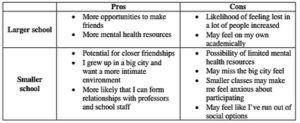By Brooke Schwartz, LMSW
Mental health concerns are widespread among college campuses. In fact, between 2007 and 2017, the percentage of college students with lifetime psychiatric diagnoses increased from 22% to 36%. If you or your child are in the process of choosing a college with mental health in mind, you may consider the following factors:
-
Size. The size of the student body has several implications, including (but not limited to) how you make friends and what institutional resources are available to you. If you’re just beginning to think about what size school might best meet your needs, consider making a pros and cons list. This exercise may not lead you to a clear answer, however it can help organize your thoughts
-
Social life and campus culture. Factors such as how people typically make friends, where people live, and where they spend their time may influence your social life at college and, thereby, your mental health. Consider the following questions: Is Greek life prominent on campus? Are there a variety of clubs and organizations to join? Do you feel that your identities are represented by the student body? Do most students live in on-campus housing or commute from home? How many people live in each dorm room? There’s no “good,” “bad,” “right,” or “wrong” answer to any of these questions. What matters is that you know yourself and your social needs. If you have any doubts about the importance of social support at college, consider this: 67% of college students tell a friend they’re feeling suicidal before telling anyone else.
-
Geographic location and accessibility. There are many reasons to consider these factors as they relate to mental health. For example, if it’s important to you to be close to home, you may look for a school nearby, close to a train station, or that allows you to park your car on campus. Conversely, perhaps you know that being within reach of home is not ideal for your mental health — for example, because it may mean falling into a pattern of going home more than is effective or beneficial, or because it means more unwanted visits from family or friends. Further, location and accessibility may influence whether you need to find new mental health providers. Your current mental health providers may have varying limitations on whether they will continue to work with you once you go to college. Consider asking your current providers how they recommend you proceed with treatment once you leave for college. If they can’t continue working with you, they may have referrals near your school.
-
Counseling options in the surrounding area. If you’re planning to find new providers near your school, it’s worth researching who practices in that area, if they have availability, if you can afford their services, and whether they offer the modality of treatment you’re seeking (such as Cognitive Behavioral Therapy or Dialectical Behavior Therapy).
-
Counseling options on campus. It may also be worthwhile to look into what mental health resources your university offers. Is there a professional counseling center on campus? What are its hours? What do they offer (e.g., groups, one-on-one counseling, peer counseling)? How easy or difficult is it to make an appointment? Knowing about the school’s emergency response procedure is another way to assess how the university can support you if you do experience a mental health emergency.
-
Accommodations. One study of college students living with mental health conditions found that 45% of those who stopped attending college because of mental health related reasons did not receive accommodations (such as excused absences for treatment, adjustment in test times, increased availability of academic advisors, and assistive technology) through their school’s disability center for a variety of reasons. For example, some weren’t aware that they qualified for and had the right to receive accommodations, some feared the stigma attached to seeking accommodations, and some found that the process for obtaining accommodations was too burdensome or required too much documentation. If you think you may benefit from accommodations, it’s worth taking the time to research what the schools you’re interested in offer.
-
Cost. Higher education is undoubtedly expensive, and there are many ways college students make ends meet including financial aid, work-study programs, loans, and scholarships. In thinking about your mental health, you may consider whether these methods of funding your education are contingent on full-time status or a minimum GPA. If you decide it’s too difficult to juggle both a full-time courseload and a work-study job, do you lose your funding? Once you graduate, how might being in debt have an impact on your mental health? How might taking out loans to attend the right (but expensive) college be worthwhile for your mental health long-term?
-
Food. Some people with mental health conditions find it difficult to maintain a healthful and consistent diet — however, not eating, overeating, and eating certain foods (depending on your needs) may contribute to and maintain negative emotions. You may find it helpful to consider how accessible food is at the colleges you’re interested in. Is a meal plan offered? What is typically served? Are there local restaurants and do they deliver?
Deciding which college is right for you requires taking several factors into consideration, particularly if your mental health and wellbeing are priorities. Here’s to making an informed decision on your mental health and your college education!
Disclaimer
This site is for information only. It is not therapy. This blog is only for informational and educational purposes and should not be considered therapy or any form of treatment. We are not able to respond to specific questions or comments about personal situations, appropriate diagnosis or treatment, or otherwise, provide any clinical opinions. If you think you need immediate assistance, call your local emergency number.
For referral information about our services, please click here or see our contact page on our website.

